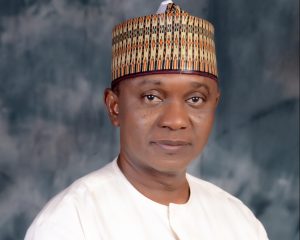Faces of Open Government: Alhaji Garba Abubakar
Rostros del gobierno abierto: Alhaji Garba Abubakar
In August 2020, President Muhammadu Buhari of Nigeria assented to the Companies and Allied Matters Act (CAMA) 2020, enhancing corporate accountability and transparency through a new registry disclosing persons with significant control of companies. The autonomous body responsible for the register is the Corporate Affairs Commission (CAC) led by Registrar General Alhaji Garba Abubakar, who sat down with OGP to discuss what the new provisions in the Law mean for the country and how Nigeria’s open government journey led to this moment.
1. Stakeholders in Nigeria in government and civil society – as well as those in the international community – have welcomed the passing of the Law and have great expectations of what it can do to enhance transparencyAccording to OGP’s Articles of Governance, transparency occurs when “government-held information (including on activities and decisions) is open, comprehensive, timely, freely available to the pub... More and accountability. What are the new provisions in CAMA 2020 trying to accomplish and why is the Law so important?
The provisions of the Companies and Allied Matters Act, 2020 on beneficial ownershipDisclosing beneficial owners — those who ultimately control or profit from a business — is essential for combating corruption, stemming illicit financial flows, and fighting tax evasion. Technical... More transparency were modeled after the United Kingdom Persons with Significant Control disclosure framework but with a lower shareholding and voting right threshold of 5%.The provisions extend to persons that control the appointment of majority of the directors, amongst others. This applies to companies registered either as public or private and limited liability partnerships.
The register will be publicly available in open dataBy opening up data and making it sharable and reusable, governments can enable informed debate, better decision making, and the development of innovative new services. Technical specifications: Polici... format. This will greatly support and strengthen the anti-corruption initiative of the Nigerian Government by providing opportunity to the public to report any noticeable misstatements.
The various anti-corruption agencies and law enforcement organisations will also have unrestricted access to the register in their investigation and law enforcement activities. This will allow for timely conclusion of investigation and tracking of illicit financial transactions.
2. This Law is a great example of cross-sector collaboration as civil society organizations, the private sectorGovernments are working to open private sector practices as well — including through beneficial ownership transparency, open contracting, and regulating environmental standards. Technical specificat... More, and the government all had a role to play in making this a reality. How did they use the OGP framework and support to help advance this initiative? What other international partners supported you in this process?
The OGP framework was the single most important platform used to achieve consensus amongst various stakeholders on the scope of application of the law and the ideal thresholds on shareholding and voting rights.
Without OGP, it would have been impossible to achieve consensus between Government Institutions and Civil Society in a manner that will be acceptable to all. Various workshops were held across the country sponsored by various state and non-state actors to enlighten stakeholders on the benefits of beneficial ownership transparency and to galvanize support for the passage of the law by the Nigerian National Assembly.
3. Now that President Buhari has assented to the Law, what’s next? How can we ensure the Law is effectively implemented to get the expected results?
The Commission is receiving a grant of USD 400,000 from the World Bank under the OGP Multi-Donor Trust FundWith the support of development partners and working together with the World Bank, OGP established the Multi-Donor Trust Fund (MDTF) to support World Bank client countries and local entities that part... for the development and deployment of electronic register of beneficial ownership (PSC). The budget includes funding for stakeholders engagement activities with civil society.
We have also been receiving technical support from Open Ownership in the design of the disclosure requirements and various training opportunities for our personnel. We also want to commend Transparency International through their Nigerian affiliate CISLAC for their unwavering support and the various training opportunities offered to us as well as enlightenment programmes and advocacy in the passage of CAMA 2020.
En agosto de 2020, el presidente de Nigeria, Mahammud Buhari, respaldó la Ley de empresas y asuntos relacionados (CAMA) de 2020 con el fin de fortalecer la rendición de cuentas y la transparencia corporativa a través de la creación de un registro de las personas que tienen control de las empresas. El organismo autónomo responsable del registro es la Comisión de Asuntos Corporativos (CAC) que lidera Alhaji Garba Abubakar, registrador general. Alhali habló con OGP sobre las implicaciones de las nuevas disposiciones de la ley para el país y sobre cómo el proceso de gobierno abierto de Nigeria llevó a este momento.
1. El Gobierno y la sociedad civil de Nigeria, así como la comunidad internacional, han aplaudido la aprobación de la ley y tienen grandes expectativas sobre lo que puede hacer a favor de la transparencia y la rendición de cuentas. ¿Cuál es el objetivo de las disposiciones de CAMA 2020 y por qué es tan importante esta ley?
Las disposiciones establecidas en la Ley de empresas y asuntos relacionados de 2020 sobre transparencia de los beneficiarios reales se diseñó con base en el modelo que establece el marco de publicación de personas con control significativo del Reino Unido, pero con un umbral de participación menor (5 %). Las disposiciones también incluyen a las personas que controlan la designación de la mayoría de los directores, entre otras. Esto aplica a las empresas que están registradas como públicas o privadas y a las sociedades de responsabilidad limitada.
El registro estará disponible al público en formato de datos abiertos, lo que apoyará y fortalecerá la iniciativa anti corrupción del Gobierno de Nigeria, pues el público tendrá la oportunidad de reportar cualquier inexactitud.
Además, las instituciones anti corrupción y organizaciones encargadas de la aplicación de la ley tendrán acceso ilimitado al registro en el marco de sus actividades de investigación y aplicación de la ley. Así, se facilitará la investigación y rastreo de transacciones financieras ilícitas de forma puntual.
2. La ley es un gran ejemplo de colaboración intersectorial, pues las organizaciones de la sociedad civil, el sector privado y el gobierno desempeñaron un papel importante en su materialización. ¿Cómo utilizaron el marco de OGP para impulsar esta iniciativa? ¿Qué otros socios internacionales les apoyaron en este proceso?
El marco de OGP fue la plataforma más importante que utilizamos para lograr consenso entre los diferentes actores sobre el alcance la ley y los umbrales de participación.
Sin OGP, habría sido imposible llegar a un consenso entre las instituciones del gobierno y la sociedad civil de forma aceptable para todos. Se organizaron varios talleres en todo el país con el apoyo de actores estatales y no estatales para informar sobre los beneficios de la transparencia de los beneficiarios reales y para lograr el apoyo para la aprobación de la ley por parte de la Asamblea Nacional de Nigeria.
3. Ahora que el presidente Buhari respaldó la ley, ¿Qué sigue? ¿Cómo podemos asegurar la implementación efectiva de la ley para alcanzar los resultados esperados?
En el marco del Fideicomiso de OGP, la Comisión recibirá una donación de USD 400 000 del Banco Mundial para el desarrollo y despliegue del registro electrónico de beneficiarios reales. Esta donación incluye financiamiento para la participación de actores con la sociedad civil.
Además, hemos recibido apoyo técnico de Open Ownership para el diseño de los requisitos de transparencia y diversas capacitaciones para nuestro equipo. Queremos agradecer también a Transparencia Internacional a través de su filial nigeriana CISLAC por su apoyo constante y por la capacitación ofrecida, además de sus programas de información y comunicación para la aprobación de CAMA 2020.
No comments yet
Related Content

Global Report: Beneficial Ownership
Beneficial ownership transparency has emerged as an essential means for combating corruption, stemming illicit financial flows, and fighting tax evasion.

Nigeria Spearheads Open Government in Africa, Takes Steps to Stop US$15.7B of Illicit Flow through Financial Systems

Beneficial Ownership
Beneficial ownership transparency has emerged as an important policy tool in countries for combating corruption, stemming illicit financial flows, and fighting tax evasion.


Leave a Reply